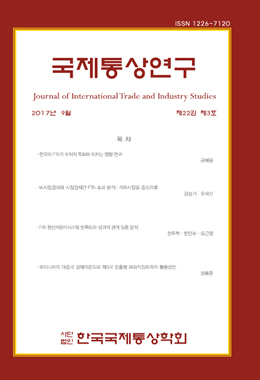본 논문은 미국이 기체결한 FTA 통신협정에 존재하는 ‘기술선택의 유연성’ 조항을 분석하였다. 우리나라와 WIPI 및 WiBro를 둘러싼 통상갈등을 계기로 미국은 WTO/GATS 체제로는 외국 정부의 기술표준조치를 충분히 규율할 수 없다고 판단하였다. 이에 FTA에 민간 기업의 기술선택의 자유를 강조하는 기술선택의 유연성 조항을 적극적으로 반영하고 있다. 가장 최근에 체결된 TPP를 포함한 미국의 FTA를 분석한 결과, 한미 FTA가 기타 FTA에 비해 정부의 기술표준 제정권한을 과도하게 제약한다는 사실을 발견하였다. 민간기업의 기술선택의 자율성과 정부의 규제권한 간 균형을 이루기 위해 추후 진행될 한미 FTA 개정협상에서 우리 정부가 적극적으로 개정을 요구해야 할 사안이라고 본다. 미국의 일방적인 요청으로 시작된 한미 FTA 개정협상이지만 보다 구체적으로는 우리도 민간기업의 기술선택의 자유와 정부의 기술표준 제정권한 간 균형을 이루는 방향으로 해당 조항을 개정하는 방안을 검토해야 한다.
This paper is to analyze the provision of the flexibility in the choice of technologies in the FTAs of the U.S. Trade disputes over WIPI and WiBro between Korea and the U.S. have made the U.S. aware that contemporary WTO/GATS regime could not sufficiently regulate the government intervention on standardization process in the ICT industry. Henceforth, the U.S. has incorporated the provision in its FTAs, aiming at allowing more flexibility for telecommunication service suppliers to choose the technologies for the service delivery. Having analyzed all the FTAs of the U.S., we find that the provision in the KORUS FTA excessively limits government’s regulatory autonomy compared to any other FTAs of the U.S. It implies the significant need for the Korean government to amend the provision in the upcoming FTA renegotiation. Renegotiation talks on KORUS was initiated by the Trump administration in a unilateral manner. Particularly, we should, however, take advantage of this opportunity in order to revise the provision on the flexibility in the choice of technologies, seeking a balance between the freedom of the choice of technology and government’s regulatory sovereignty.




